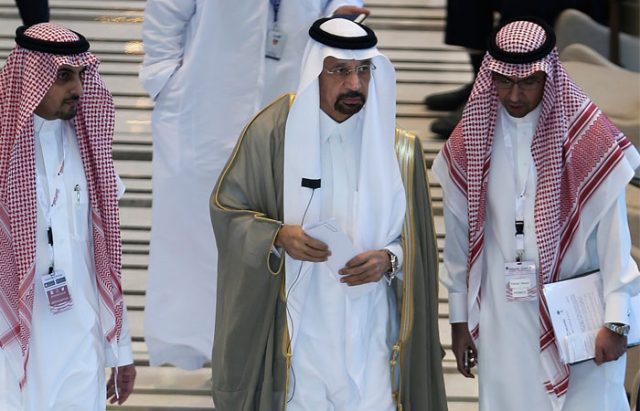
Falih optimistic about oil market stabilization
Minister of Energy, Industry and Mineral Resources Khaled Al-Falih said Thursday he was optimistic about a stabilization of the oil market following an OPEC deal to cut output.
“We believe that the agreement that we refer to between us and OPEC and non-OPEC members will hold,” he said at an energy conference in the UAE.
Falih was chairing the Sustainability Week here. The forum saw participation from world intellectuals, policymakers, investors, industry magnates and defenders of the environment.
Falih said Saudi Arabia had exceeded its pledges to cut production, without giving any figures.
“I’m confident that, (with) the commitment of 25 countries and the growth in demand as well as decline (in production), the market will balance and the prices will respond quickly,” he said here.
“In 2017 we are expecting demand to continue to grow at the pace we have seen lately at about a million barrels” per day, he added.
Saudi Arabia and fellow members of the Gulf Cooperation Council (GCC) — Bahrain, Kuwait, Oman, Qatar and the UAE — “want moderation,” the minister said.
“We want prices that are supporting continued production as well as continued consumption,” he added, saying he had no specific price target.
The agreement to cap production came into force on Jan. 1 but doubts remain about implementation before data is released at the end of the month.
OPEC Secretary General Mohammed Barkindo described the commitment of member and non-member oil producing countries to reduce production as “unparalleled”.
In the opening speech, Falih explained that the world will continue its dependence on conventional hydrocarbon resources as fuel to stimulate the growing desire for development and innovation, and for a period of no less than a few decades before achieving a more balanced mix of conventional and alternative fuels, including renewable energy resources.
He added that demand for energy will continue to grow and must be achieved, taking into account the choice of energy sources.
The energy demand in the world today is about 280 million barrels per day of oil equivalent. Over the next 25 years, Al-Falih expects this rate to increase by more than 40% to nearly 400 million barrels.
And with the expected increase in the world population by about two billion, there are logical expectations for higher standards of living that require more energy, but are partly governed by the awareness of the importance of improving energy efficiency, he remarked.
Despite the great reliance on conventional fuels, the balance will be achieved as the world managed to address the serious climate change and embrace the call to take action to reduce global carbon emissions.
Al-Falih announced that the turning point was the Paris Convention, which was signed in 2015 and ratified by Saudi Arabia last year. “Furthermore, we are required to implement the Paris Convention and reduce carbon emissions, especially, due to our leading role in this field,” he stated.
The natural gas consumption, which is cleaner, will be about 70% of the mix energy over the next decade, the highest rate among the Group of Twenty (G-20), stressing the importance of the enormous renewable energy potential.
He said the expense of energy from the sun, for 90 minutes, gives an excess of energy generated by 15 billion tons of oil equivalent. Annually, this gives more than the world needs, while the wind can provide an equivalent of 146 billion tons of oil equivalent per annum.



























